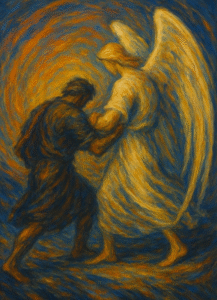The Great Fall of a Great Man
“How could he be wrong? Isn’t he a Rabbi?” There are various versions of the same question, usually revolving around the greatness of the individual and the disparity between his status and his actions. We assume that since someone has achieved a measure of prominence, his actions should reflect his outstanding level. However, the biblical figure Korach completely invalidates this argument.
Korach was no ordinary fellow. He was the leading Levite, a close relative of Moses, a tremendously clever fellow, and enormously wealthy. He was so great that he was followed by 250 members of the Sanhedrin. Yet Korach openly rebelled against Moses, who was doing nothing other than following the directive of God. How could Korach fall so low? How could a Rabbi be so wrong?
Spiritual growth is like arm-wrestling. The more you press forward, the greater the resistance you encounter. In order to rise from one spiritual level to the next, the dinim associated with the new level must first be mitigated. Dinim are harsh judgments; they are the protective forces maintaining the balance of good and evil. These forces challenge you to prove that you are sufficiently worthy of this new level. If you want to claim it, you must prove your resilience.
The Jewish people had achieved universal prophecy at Mount Sinai. Each person heard God speak to them directly. Korach therefore claimed, “The entire congregation is holy, and God is in their midst. So why do you raise yourselves above God’s community?” (Numbers 16:3). Korach was arguing, “Haven’t we all made it?”
Korach’s line of reasoning was that the mitzvahs are a rational device. They are building blocks that can be used in a logical way to attain what one wants to achieve spiritually. In his mind, Korach had mastered the Torah just like Moses, and his greatness was a fait accompli. Because Korach truly was at a mighty level, the dinim at that level were enormous. They espoused his greatness, and his ego ultimately got the best of him. He did not manage to conquer them.
Korach challenged, “If a tallit is made completely out of tekheilet threads, does it require tzitzit? Since a single strand of tekheilet on the tzitzit is sufficient for the mitzvah, shouldn’t an entire garment made of tekheilet be exempt from tzitzit?” (Rashi on Numbers 16:1). The answer is a resounding no! The mitzvahs are not logical devices; we cannot put human limitations on them. When we are privileged to fulfill a mitzvah, we are connecting with the highest place. Just as God is infinite, so are His Torah and mitzvahs. There are immeasurable levels to reach, and yet God is completely connected to us at each level.
If we have achieved a certain spiritual goal, such as praying with intensity, we shouldn’t be deceived into thinking we have mastered the skill. As we continue to grow in the art of prayer, we will be challenged at every level. We have to be ready for this and push onwards. We have to display utter humility and sincerity. Yes, we connected with God at our new level, but there are many higher levels of connection.
Korach continued, “The minimum area of a leprous mark to be deemed impure is about one square centimeter. However, if the leprous mark spreads to the entire body, it is a sign of purity. How can this be?” (Yerushalmi, Sanhedrin 10:3). Again, his argument was incorrect. Just as we connected to God at the higher level, so does He exist at the lowest level. Sometimes, only when we hit rock bottom can we reconnect and move ahead. Mitzvahs are beyond our comprehension, they are one with God. It is our job to humbly and respectfully seek God from wherever we are. In this way, we will eventually reach our goal. Amen!
Based on Likutey Halakhot, Shiluach HaKen 4
- 0 comment






















